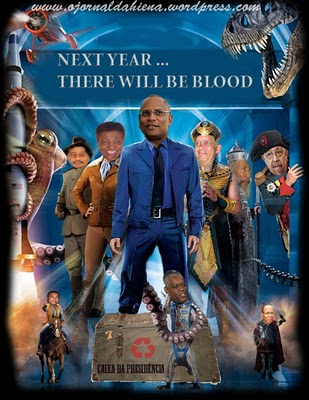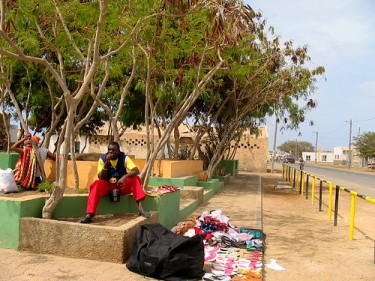Cape Verdeans headed to the polls to vote for Members of Parliament on February 6, and granted PAICV's (African Party for the Independence of Cape Verde) leader José Maria Neves his third 5-year term as Prime Minister. Here is a recap on how bloggers perceived the events and envision the development of the country.
Political Arena's Poles

Caricature made by Jornal da Hiena in 2010 and published at Café Margoso. The author allowed the use of the image.
Since 1991, when Cape Verde adopted the multi-party system, the PAICV and the MpD (Movement for Democracy) have been the two most influential political parties. Each party ruled the country for 10 years. Carlos Veiga, member of MpD, was the main candidate facing the Prime Minister in power, José Maria Neves.
Virgilio Brandão, on the blog Terra-Longe, shared an analysis [pt] of the results, which gave PAICV MPs an absolute majority of National Assembly seats. He considered that the way candidates dealt with the results reveals a country that, in spite of all its problems, including those within the political process, made the elections a legitimate feature:
O discurso de José Maria Neves foi de quem soube ganhar, e o de Carlos Veiga de quem soube perder. Em contraponto da campanha eleitoral, as declarações destes dois líderes […], ao se conhecerem os resultados oficiosos, qualificaram o processo eleitoral.
For blogger Rony Moreira [pt], from Geração 20 J. 73, the political polarization “over the decades of MpD [rule] and the other 10 years of PAICV” was just a “languishing discussion”.
Challenges for Growth and Development
Rony Moreira looks at the country as a whole and argues [pt] on the reasons why the political event was so important:
A tarefa de governar Cabo Verde é tão grata, que muitos ainda não perceberam que o mais essencial e complexo neste processo de governação passa pela implementação dum equilíbrio frágil: como deve um país pobre, redistribuir a riqueza (produzida e doada) de forma a equilibrar a coesão social e ao mesmo tempo criar mecanismos económicos (como a infra-estruturação) que o capacita para a competição e desenvolvimento futuro.
As a candidate, José Maria Neves promised to create a minimum wage and to tackle unemployment (different estimates range from 13,1% to 20,9% [pt]), but, once elected, he postponed these measures until 2012. Edy, blogger on Blogue di Nhu Naxu, says it was reasonable [pt]:
E já agora,este apertar de cinto não tem nada de surpreendente e nada de anormal: é que é mesmo necessário baixar o défice das finanças públicas.O país está a viver acima das suas possibilidades.
On another post, Rony Moreira isn't too concerned about the unemployment rate either, as he highlights [pt] that Cape Verde is making progress, with both its positive and negative factors:
[…] a ausência de recursos matérias valiosos; estruturas de mercado deficitário [na dimensão, no tecido empresarial; alto grau de dependência de investimento e de factores externos]; taxa de crescimento de habitantes residentes [nativos e estrangeiros] e subsequente aumento da população activa; continuação de aposta na formação e qualificação dos quadros jovens […]

Informal trader in Cape Verde. Original title: "cabo verde MAYO-06". Photo by roser.gilbert and published on Flickr, under a Creative Commons license (BY-NC-ND, 2.0).
In another post, Edy believes [pt] that Cape Verde's economic situation is understandable if we take into account global events:
[…] nem sempre é possível atingir o nível de crescimento económico desejável porque um governo não consegue controlar ou prever a evolução da economia internacional, do qual estamos dependentes, para o bem e para o mal […]
João Branco, on the blog Café Margoso, wrote a post with personal considerations. He pondered that [pt] Cape Verde “is not walking towards the precipice, it isn't near total breakdown” as the opposition claimed, and nor is it “the pink-colored country the ruling party wanted to portray”.
Rony Moreira foresees challenges [pt] for the reelected Prime Minister, as solutions must be found to high unemployment rates and other national issues:
Ganha a eleição, há quem pense que esta será a mais fácil das legislaturas de Neves, e eu prevejo que seja a mais difícil e trabalhosa que o PAICV terá pela frente. Porque em 2016 alguns dos desafios terão de ser vencidos, caso da energia, educação, a redução para um dígito do desemprego e a habitação.
Democracy in Progress
Despite political preferences, Cape Verdeans expressed in the blogosphere their satisfaction with the election process. João Branco was one of those bloggers, saying he is proud [pt] of Cape Verde's 20 years of democracy:
Vinte anos. Não é nada, numa perspectiva histórica. No entanto, o país que somos hoje mostra o quanto se avançou no domínio de uma plena democratização do arquipélago e da sua sociedade. Comparem o ontem e o hoje e vejam as diferenças abismais, o que já se conquistou.
In just a few months’ time, Cape Verdeans will have to put their country under scrutiny once again, with the upcoming 2011 Presidential Elections. As political figures rethink their strategies, citizens will have another chance to practice democracy and set forth the country they envision through their vote.







3 comments
Great post!
PS: The blogger’s name is João Branco, not João Bosco who is a brazilian singer.
I’m glad you liked it, Amílcar! The Portuguese version will be published tomorrow.
And thank you for the “ps”. I have just changed it; I misspelled the blogger’s name the second time..
You’re welcome. I’m a huge GlobalVoices fan. Keep the good work!